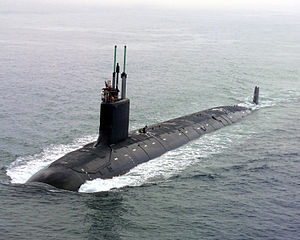
The Virginia class, also known as the SSN-774 class, is a class of nuclear-powered fast attack submarines (hull classification symbol SSN) in service with the United States Navy. The submarines are designed for a broad spectrum of open-ocean and littoral (shallow coastal water) missions. They were conceived as a less expensive alternative to the Seawolf-class attack submarines, designed during the Cold War era. They are replacing older Los Angeles-class submarines, many of which have already been decommissioned. Virginia-class submarines will be acquired through 2043, and are expected to remain in service past 2060.
The class was developed under the codename Centurion, renamed to New Attack Submarine (NAS) later on.
The Virginia class was intended in part as a less expensive alternative to the Seawolf-class submarines ($1.8 billion vs $2.8 billion), whose production run was stopped after just three boats had been completed. To reduce costs, the Virginia-class submarines use many "commercial off-the-shelf" (COTS) components, especially in their computers and data networks. In practice, they actually cost less than $1.8 billion (in fiscal year 2009 dollars) each, due to improvements in shipbuilding technology.